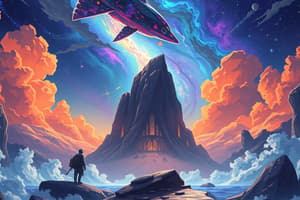Podcast
Questions and Answers
What are the key components of artistic/creative literacy, and how do they contribute to a holistic understanding of artistic expressions?
What are the key components of artistic/creative literacy, and how do they contribute to a holistic understanding of artistic expressions?
The key components of artistic/creative literacy are critical thinking and analysis, creative expression, cultural awareness, and technical skills. These components enable individuals to interpret, analyze, and create artistic works, fostering a deeper understanding and appreciation of diverse artistic expressions.
How does artistic/creative literacy contribute to cultural enrichment, and what are some examples of its impact on society?
How does artistic/creative literacy contribute to cultural enrichment, and what are some examples of its impact on society?
Artistic/creative literacy contributes to cultural enrichment by fostering empathy and understanding through the appreciation of diverse artistic expressions. Examples of its impact include promoting cultural preservation, social commentary, and community engagement.
What is the significance of incorporating arts education in formal education, and how can it enhance students' academic and professional skills?
What is the significance of incorporating arts education in formal education, and how can it enhance students' academic and professional skills?
Incorporating arts education in formal education enhances students' critical thinking, communication, and collaboration skills, making them more applicable in various fields. It also develops creative confidence, self-expression, and problem-solving skills.
How does self-directed learning contribute to the development of artistic/creative literacy, and what are some examples of online resources and tutorials that can facilitate this process?
How does self-directed learning contribute to the development of artistic/creative literacy, and what are some examples of online resources and tutorials that can facilitate this process?
What is the role of interdisciplinary approaches in developing artistic/creative literacy, and how can they enhance the learning experience?
What is the role of interdisciplinary approaches in developing artistic/creative literacy, and how can they enhance the learning experience?
How can community engagement and participation in cultural events contribute to the development of artistic/creative literacy?
How can community engagement and participation in cultural events contribute to the development of artistic/creative literacy?
What is the significance of critical thinking and analysis in artistic/creative literacy, and how can it be developed?
What is the significance of critical thinking and analysis in artistic/creative literacy, and how can it be developed?
How can artistic/creative literacy contribute to personal growth and self-expression, and what are some examples of its impact on individuals?
How can artistic/creative literacy contribute to personal growth and self-expression, and what are some examples of its impact on individuals?
What is the role of technical skills in artistic/creative literacy, and how can they be developed?
What is the role of technical skills in artistic/creative literacy, and how can they be developed?
How can artistic/creative literacy contribute to social impact, and what are some examples of its influence on society?
How can artistic/creative literacy contribute to social impact, and what are some examples of its influence on society?
Flashcards are hidden until you start studying
Study Notes
Defining Artistic/Creative Literacy
- Artistic/creative literacy refers to the ability to understand, appreciate, and create artistic expressions across various forms, such as visual arts, music, dance, theater, and creative writing.
- It involves developing skills to interpret, analyze, and critically think about artistic works, as well as to create original artistic expressions.
Key Components of Artistic/Creative Literacy
- Critical thinking and analysis: understanding the context, themes, and symbolism in artistic works
- Creative expression: developing skills in various art forms to convey ideas and emotions
- Cultural awareness: recognizing the diversity of artistic styles, traditions, and influences
- Technical skills: mastering various techniques, materials, and technologies used in artistic creation
Importance of Artistic/Creative Literacy
- Cultural enrichment: appreciate and engage with diverse artistic expressions, fostering empathy and understanding
- Personal growth: develop creative confidence, self-expression, and problem-solving skills
- Academic and professional applications: enhance critical thinking, communication, and collaboration skills, applicable in various fields
- Social impact: contribute to cultural preservation, social commentary, and community engagement through artistic expression
Developing Artistic/Creative Literacy
- Formal education: incorporate arts education in schools, colleges, and universities
- Community engagement: participate in workshops, classes, and cultural events that promote artistic literacy
- Self-directed learning: explore online resources, tutorials, and artistic communities to develop skills and knowledge
- Interdisciplinary approaches: integrate arts with other subjects, such as science, technology, engineering, and mathematics (STEAM)
Defining Artistic/Creative Literacy
- Artistic/creative literacy is the ability to understand, appreciate, and create artistic expressions across various forms.
- It involves developing skills to interpret, analyze, and critically think about artistic works, as well as creating original artistic expressions.
Key Components of Artistic/Creative Literacy
- Critical thinking and analysis involves understanding the context, themes, and symbolism in artistic works.
- Creative expression involves developing skills in various art forms to convey ideas and emotions.
- Cultural awareness involves recognizing the diversity of artistic styles, traditions, and influences.
- Technical skills involve mastering various techniques, materials, and technologies used in artistic creation.
Importance of Artistic/Creative Literacy
- Cultural enrichment enables appreciation and engagement with diverse artistic expressions, fostering empathy and understanding.
- Personal growth involves developing creative confidence, self-expression, and problem-solving skills.
- Academic and professional applications enhance critical thinking, communication, and collaboration skills, applicable in various fields.
- Social impact involves contributing to cultural preservation, social commentary, and community engagement through artistic expression.
Developing Artistic/Creative Literacy
- Formal education involves incorporating arts education in schools, colleges, and universities.
- Community engagement involves participating in workshops, classes, and cultural events that promote artistic literacy.
- Self-directed learning involves exploring online resources, tutorials, and artistic communities to develop skills and knowledge.
- Interdisciplinary approaches involve integrating arts with other subjects, such as science, technology, engineering, and mathematics (STEAM).
Studying That Suits You
Use AI to generate personalized quizzes and flashcards to suit your learning preferences.




